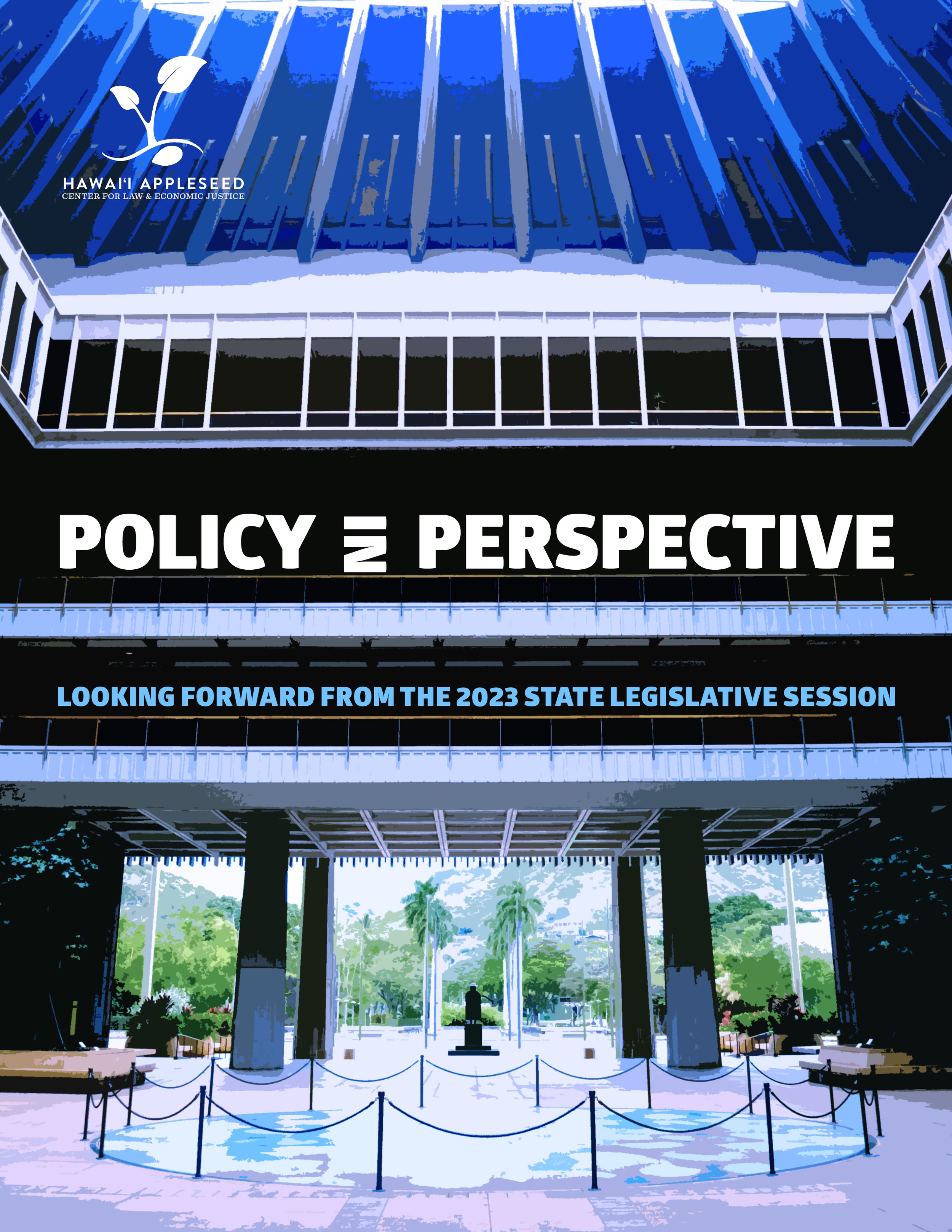Policy in Perspective 2023
Looking forward from the 2023 state legislative session.
Executive Summary
Hawaiʻi Appleseed is committed to a more socially and economically just Hawaiʻi, where everyone has genuine opportunities to achieve economic security and fulfill their potential. Our theory of change involves conducting data analysis and research to address economic inequality, educating policymakers and the public, engaging in collaborative problem solving and coalition building, and advocating for policy and systems change. It is through that lens that we evaluate each legislative session—an annual window of opportunity to impact state law with policy that addresses inequality and fosters greater opportunity for all of Hawaiʻi’s people.
The 2023 legislative session was the first to include the outsized wave of new lawmakers who came into office just after the most recent reapportionment process, a decennial shakeup of political boundaries. It was also the first session with the Green Administration helming the state’s executive branch, and without now-Lt. Gov. Sylvia Luke chairing the powerful House finance committee. Other longtime lawmakers were tapped for executive branch positions or resigned due to scandal. The high volume of turnover may have adversely impacted management of the legislative process—particularly the already chaotic conference committee step. Many widely-supported bills that were expected to pass were, instead, left on the table.
Another major factor that impacted the tone of the 2023 legislative session was the state’s revenue forecast going into the session. In January, the state’s Council on Revenues was projecting a budget surplus of $2 billion that lawmakers would have to work with, which likely impacted the lens through which many tax and budget proposals were viewed. By the halfway point of the session, in March, the council had downgraded its prediction by more than $300 million, which changed the way these proposals were framed by lawmakers yet again. This shifting budget landscape is a common variable that often complicates advocacy efforts. While the legislature made significant progress in supporting working families as they struggle with Hawaiʻi’s high cost of living by expanding, again, the state Earned Income Tax Credit, it did not act on generating new, consistent, equitable sources of revenue through higher taxes on corporations and the super wealthy.
Nevertheless, the legislature did direct, over the next two fiscal years:
$827.6 million toward programs to create housing and mitigate houselessness;
$175.9 million for healthcare and wellness;
$52.4 million for early learning; and
$284 million to address climate change and ecosystem degradation.
As the Hawaiʻi Budget & Policy Center concluded in its analysis of the fiscal biennium 2024–2025 budget, many of these investments are critical for Hawaiʻi’s future. However, the legislature also chose to bank $1 billion into the Emergency Budget Reserve, or rainy day fund. As lawmakers who ended up voting against the 2023 budget bill noted: for many of their constituents it’s raining right now, and that’s money that should have been used to provide relief today.
While external factors are certainly important in shaping the outcome of each legislative session, the continuing importance of centering impacted communities through our “people first” approach is a constant, essential ingredient to success. No matter what the budget outlook is, or which lawmakers chair which committees, advocacy efforts are only successful when they are backed by the people. In this report, we provide key takeaways from our efforts in 2023 before diving into detail about the efforts behind each Hawaiʻi Appleseed issue focus area: affordable housing, anti-hunger, labor & wages, and tax & budget.

